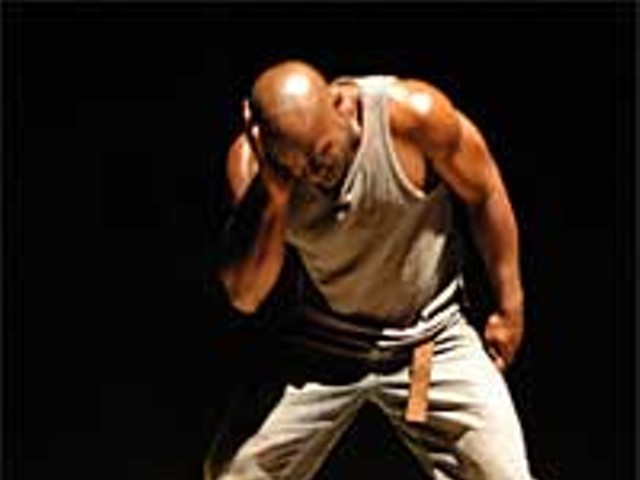Abreact Theatre, situated in a Greektown loft, half living space, half theater, deserves applause for trying to put on an ambitious project on a shoestring budget. Unfortunately, it comes across as a failure of imagination.
The original Watermelon Man is a 1970 film directed by Melvin Van Peebles and starring Godfrey Cambridge. Its plot turns on the lampooning of a chauvinist and racist suburbanite, a white man who awakens in the middle of the night and realizes he's turned black. In 1970, we were still finding out about the insidious racism in our society, and the film pointed out this painful truth without the accompanying mea culpa so prevalent in the performing arts these days.
The best thing about the script is that it makes good use of satire, a fine way to explore touchy subjects by keeping an audience laughing. In this production of Watermelon Man, adapted and directed by Phil Bolden, the plot remains intact. Jeff Gerber wakes up and is shocked by his transformation. His wife is repelled, and a female co-worker suddenly finds him a sexual turn-on, while his boss can only see the situation as a way to turn a profit — he wants to use Gerber's new identity as leverage in selling insurance to the black community.
Gerber struggles with his transformation and wonders, reasonably so, if he spent too much time under a sunlamp or if he's had a bad reaction to something he ate. In any case, what happens next is telling. As a white man, Gerber is accepted as a smart-aleck. But as a black man, he is "intolerated" and condescended to — so the chickens, satirically speaking, come home to roost.
In the film, Cambridge, who is black, plays Gerber in pasty "whiteface": With an aquiline nose and other facial features that could be construed as Caucasian if his skin were lighter, Cambridge successfully passed for white and pumped up the volume, to great effect, as a black man.
On Abreact's stage, Watermelon Man loses a great deal of its bite. Actor Gregg McNeal, who plays Gerber, is also black, and his whiteface looks like a cover-up; he wears an atrocious blond wig that nearly falls off with his hat and makeup that resembles a plate of green curry. Why his trousers need to be several inches too small around the waist is anybody's guess. At best, his appearance is confusing. At worst, it just looks sloppy.
McNeal's booming voice projects at two levels — loud and louder — and the actor has a vigorous laugh that sounds like a stun gun in an echo chamber. Despite the fact that his character undergoes radical change, his vocals and movements remain the same. In the film, actor Cambridge and director Van Peebles made the point that Gerber was a pissy white guy with an ignorant point of view who then became a black guy with accent and attitude. But McNeal plays both white and black the same way, so the humor is lost.
Phil Bolden's adaptation directly translates the film's plot to the stage, often without justifying events. One example is Gerber's early morning race with the city bus as proof that he's fit. The point is made in the film that he's an exercise nut, but in this version, we have no idea why he's running, and we have to take it for granted that, somehow, it's funny. It's not. It's not clear whether Bolden, as director, has done much more than suggest where actors and actresses should sit or stand, or when they ought to move. Outdoor scenes from the movie are filmed with McNeal and projected onto a center stage pull-down screen; we also see the PowerPoint tool bar projected onto the screen preceding each of these scenes.
The other seven actors in the cast seem to only care about getting through the material, and the set design, by Phil Bolden and Chuck Reynolds, would be good for The Honeymooners but not for a suburban family of some means in the 1970s. Everything looks old, tacky or borrowed.
On a Sunday show, the tiny theater space was cold. However, there was a complimentary pre-show brunch of spicy and mild munchies and non-alcoholic drinks that put everyone in a good mood. It was probably a good idea.
8 p.m., Fridays and Saturdays through March 11; 442 E. Lafayette Blvd., Detroit; 313-378-5404.
Michael H. Margolin writes about theater and the performing arts for Metro Times. Send comments to [email protected]




